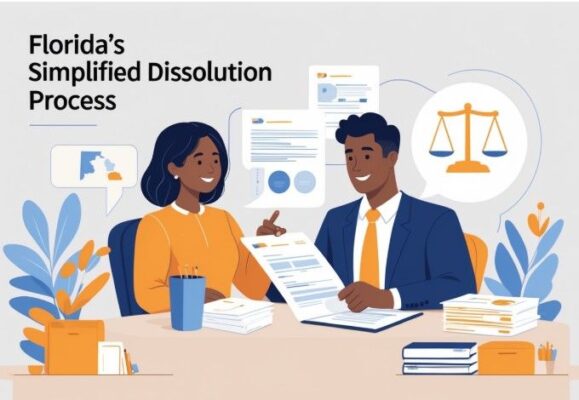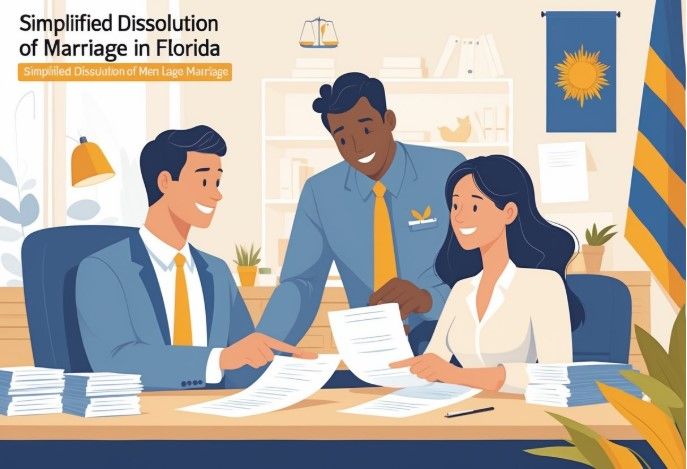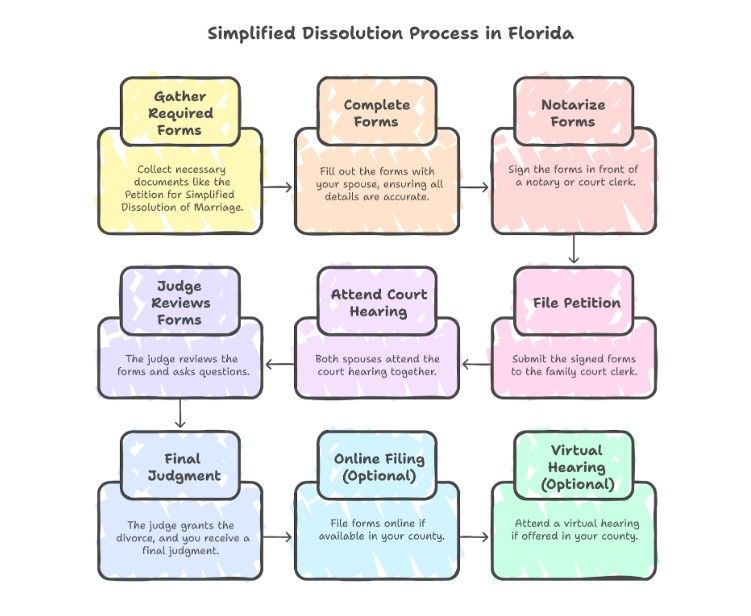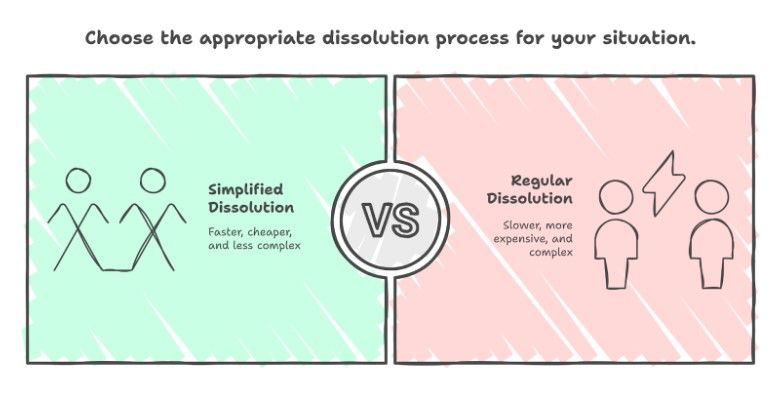

We now offer Virtual Mediations using Enhanced Video Conferencing
Originally published: May 2025

If you and your spouse can agree on all issues and meet certain requirements, the simplified dissolution process might save you both time and stress.
This approach is for people who want to avoid long court battles and just move on with life.
Before you decide, make sure you understand how this process works and whether you meet the rules.
Things like not having minor children together and agreeing on property division are big factors.
If you know the steps and what to expect, you can make a more confident choice.

A simplified dissolution of marriage lets you and your spouse get divorced without a long court trial. Both people must agree to use this process and meet all the legal conditions.
It’s mostly for people who don’t have kids, don’t own much property, and can agree on how to split what they have. Florida law makes this option available to save you time and money.
Unlike a regular divorce, no formal discovery or long court hearings exist. You file the right forms, show up in court together, and prove your marriage is “irretrievably broken.”
If all the paperwork is in order, the judge might grant your divorce on the same day.
You’ll still have to share some financial information with each other, but the rules are easier than in a traditional divorce. You’ll have to use the regular process if you don’t meet all the requirements.
Florida created the simplified dissolution of marriage to simplify divorce for people in simple situations. The state knows that sometimes a long legal process isn’t necessary or helpful.
Couples without kids or big disagreements can benefit from this approach. This process helps lower costs, reduce paperwork, and avoid a lot of emotional stress.
Before you start, you and your spouse have to agree on everything, including how to split any debts or property. A simplified process could be the right move if you just want to finish quickly.
Many people choose this option to avoid formal discovery and long court hearings in the Florida simplified divorce process. Not everyone will qualify, though.
At least one spouse must have lived in Florida for the required time, and both of you must agree that the marriage is beyond repair.
If that fits your situation, this process can help you end your marriage respectfully and efficiently.
A simplified divorce in Florida is a faster, easier way to end a marriage if you meet certain conditions. Both parties have to agree, and you can’t have minor children.
To file for a simplified divorce in Florida, you and your spouse must cooperate. You both have to agree to use this process, and neither side can contest the divorce.
This is often called an uncontested divorce. Before filing, each spouse must have lived in Florida for at least six months.
Residency can be proven with a Florida driver’s license or other legal documents. Both spouses must also show up and sign documents together.
No minor or dependent children can be involved. If you’re pregnant or have children under 18 together, even if they aren’t dependent, you’re not eligible.
There can’t be any ongoing child support or custody issues. Alimony can’t be requested. If either person wants alimony, this process isn’t for you.
You both need to agree on splitting assets and debts before filing.
Certain things stop you from using the simplified process. You can’t use it if you and your spouse have minor or dependent children together, are pregnant, or want to discuss custody, child support, or alimony.
You can’t use this option if one spouse doesn’t agree to every part of the divorce, including property, debts, and the process itself. Even a small disagreement makes you ineligible.
Having shared children or a contested case means you’ll have to use the standard dissolution process. If you aren’t both willing and able to attend the final court hearing in person, you’re also disqualified.
Skip the legal stress and get clarity fast. Ann Goade offers guidance through Florida’s simplified dissolution process to help couples divorce quickly and peacefully. Schedule your consultation with us today.
If you’re ready to get started, call us now!

Filing for a simplified dissolution in Florida is pretty straightforward if you and your spouse agree on all major issues and meet the requirements. This process saves time and can reduce stress.
Make sure you have all your paperwork in order and follow each step closely.
To start a simplified dissolution in Florida, you need to complete specific forms. The main form is the Petition for Simplified Dissolution of Marriage (Form 12.901(a)).
Both you and your spouse fill out this form together. Gather financial affidavits, a property settlement agreement, and the petition if you have assets to divide.
In some counties, you’ll also need to show proof of residency, like a driver’s license or utility bill. Make a checklist to keep track of what’s required.
Be sure both of you sign all forms before a notary or the court clerk when needed.
File your signed forms with the family court clerk in the county where you or your spouse lives. There’s a filing fee, but some people qualify for fee waivers.
After filing, the clerk gives you a final hearing date. Both spouses have to attend the court hearing together.
The judge reviews your forms and asks questions to confirm you meet all the legal requirements. If everything checks out, the judge grants your divorce at the hearing.
You’ll receive a final judgment, and your marriage is officially over. However, your case may be delayed or canceled if you don’t attend your court date.
Some Florida counties now let you file simplified divorce forms online. You may be able to complete and submit your documents through the court’s electronic filing system, which makes things faster and easier.
This can be especially helpful if you and your spouse live in different places. Virtual hearings are also possible in some counties.
You might not need to go to court in person, but you and your spouse must still appear together on a video call.
Not every county offers these options, so check with your local clerk or see info about online divorce options in Florida.
Always double-check the latest requirements and availability. Online services and virtual hearings are expanding, but aren’t everywhere.
This can save you time and make things more convenient, especially if traveling or scheduling is tough.
A simplified divorce in Florida allows you to end your marriage faster if you agree and meet the court’s requirements.
It’s built to save you time, money, and stress compared to traditional divorce.
With a simplified divorce, you move through the court system much faster than a standard divorce. If you and your spouse agree on everything, you can often finish the process about 30 days after filing.
This is one of the quickest ways to get divorced in Florida. You don’t have to wait months for a hearing or go to court repeatedly.
Both of you usually show up once, together, to finalize things. The steps are simple, and you might not even need a lawyer, which makes it easier to handle on your own.
If you want a quick divorce in Florida without a lawyer, the simplified dissolution option is often the best choice for uncontested cases.
Saving money is a huge reason people choose the simplified process. Court fees and filing costs are lower, and you avoid paying for extra legal help or long negotiations.
With the affordable divorce Florida simplified option, everything gets streamlined. There’s less paperwork, which keeps legal bills down, and the steps are less confusing.
This helps cut stress and emotional strain since you don’t have to argue in court or deal with drawn-out battles. Here’s a quick list of main cost-savers:
You keep more control over your budget and can move forward without high emotional costs.
The simplified divorce process does a much better job of protecting your privacy than a typical court battle. Most of the details stay between you and your spouse.
There’s way less public exposure because you don’t need as many court records or hearings. Since this path is meant for couples who already agree on the basics, you both get more say in how things end.
This makes for a more amicable divorce in Florida and helps both of you feel more at ease. You decide what happens with your assets and how to settle things.
Judges don’t get in the way much, so you and your spouse control the whole process from start to finish. That kind of mutual agreement keeps your personal life out of the spotlight.
Are you not sure if a simplified divorce is the right fit? Ann Goade helps Florida couples assess eligibility and navigate paperwork with ease. Contact us now to explore your options for a faster resolution.
If you’re ready to get started, call us now!
A Florida simplified dissolution moves faster, but it comes with restrictions. It’s not always the best fit, especially if your assets are uneven or you have legal concerns.
Choosing a simplified dissolution means giving up some legal protections that come with a regular divorce. You and your spouse must waive your right to a trial and appeal.
So, you can’t ask a judge to review or change the agreement later if you feel it was unfair. Once you sign, it’s final.
You also can’t request alimony or spousal support with this process. If you think you’ll need financial help from your ex, this probably isn’t the route for you.
There’s also no formal discovery process. That means you have less chance to check if all finances and property are fully shared.
You have to trust that your spouse is being honest about assets, debts, and income before you sign. If you’re worried something important might be missed or hidden, it’s smart to talk with a lawyer first.
This process works best for couples who agree on everything and have simple situations. It doesn’t allow child custody, support, or shared parenting arrangements.
If you have minor children, you can’t use this process. It’s also off the table if your finances are complicated or you don’t agree on how to split things.
You might be disadvantaged if your spouse handles most of the money or if there’s an uneven power dynamic. The process doesn’t really protect your interests in those situations.
If you’re worried about fairness, property division, or getting all the necessary information, this option might not work for you.

Choosing between simplified dissolution, mediation, or a regular divorce can shape your whole experience. Each one has its own requirements, timelines, and costs that might better suit your situation, or not at all.
The simplified dissolution process in Florida is for couples who agree on the big stuff, like splitting property, and don’t have kids together.
It’s faster and cheaper than a regular divorce because you skip several steps, like financial discovery and many court hearings.
A regular dissolution (regular divorce) is for couples who don’t agree on everything, have kids, or own complicated assets.
This one takes longer—sometimes months or more—and comes with higher costs because of legal fees and all the paperwork.
| Process | Time | Cost | Complexity |
| Simplified Dissolution | A few weeks to 2 months | Low | Simple paperwork, fewer steps |
| Regular Divorce | Several months to over a year | High | More forms, court dates, and legal help are needed |
Mediation might be a good call if you and your spouse need help reaching agreements but want to avoid a drawn-out court fight.
In divorce mediation, a neutral third party helps both parties discuss tough issues, such as money or parenting schedules, to find a workable solution.
Mediation usually saves time and money compared to a regular divorce. It’s private, so your personal business doesn’t end up in open court.
This gives both people more control and can lower conflict. If you don’t meet the requirements for a simplified dissolution—maybe you have kids or you’re not on the same page about assets—mediation is often a better and less stressful option than fighting in court.
Mediation can also help if you start with a simplified process but have disagreements along the way.
Filing for divorce in Florida without a lawyer saves money, but it’s easy to miss important legal details. Some couples do everything themselves, while others find a lawyer’s advice helpful, even for simple cases.
A simplified divorce in Florida is meant for couples who agree on everything and don’t have kids together. Even if your case seems simple, there might be things you haven’t considered.
Legal advice is helpful when splitting property, dealing with debts, or ensuring all the forms are completed correctly.
If you’re unsure about what you’re signing, a lawyer can check your documents to ensure you don’t make mistakes.
According to the State of Florida, most people can file for divorce without an attorney if they both agree on the terms. Still, a legal pro might spot issues you’d miss.
You might want legal advice if:
Professional help can save you headaches later, especially if your finances or property are complicated.
Ann Goade helps people get divorced without a lawyer (pro se). She doesn’t represent you in court, but will guide you through the paperwork and court steps.
Ann can explain Florida’s forms and help you avoid mistakes. Many pro se clients say her step-by-step guidance makes things less stressful.
She answers questions about local requirements and court deadlines. With Ann’s support, you stay in control but have backup if you get stuck.
She uses checklists, written instructions, and follow-up calls so you feel ready at every step.
For many, working with an experienced attorney just makes filing for divorce in Florida without an attorney less confusing and a lot more manageable.
Choosing simplified dissolution in Florida can speed up your divorce process. It also makes things less stressful.
This option could work if you and your spouse agree on the key issues. However, not everyone qualifies for simplified dissolution.
You and your spouse need to meet some basic requirements. First, you must live in Florida for at least six months.
You can’t have minor children together. It’s worth double-checking these eligibility requirements before signing on.
Deciding if simplified dissolution is the right move can be tricky. Open conversations with your spouse and reflecting on what you need can help.
Sometimes, talking to a lawyer just makes sense. It helps you understand your rights and determine what’s best for your future.
Ready to end your marriage with less hassle? Ann Goade supports Florida’s simplified divorce filers through flat-fee consultations and mediation. Schedule your appointment now to get started.
What is simplified dissolution of marriage in Florida?
It’s a streamlined divorce process for couples without children who agree on all issues. Both spouses must appear in court together to finalize the divorce.
Who qualifies for a simplified divorce in Florida?
To qualify, you must have no minor children, no pregnancy, agree on asset division, and both parties must attend the final court hearing in person.
How long does a simplified divorce take in Florida?
Most simplified divorces in Florida are completed in 30 to 60 days, depending on your local court’s schedule and how quickly you file the required paperwork.
What forms are needed for a simplified divorce in Florida?
You’ll need the Petition for Simplified Dissolution, financial affidavits, a settlement agreement (if applicable), and a Final Judgment of Dissolution form.
How much does simplified dissolution cost in Florida?
Filing fees range from $350 to $410, depending on the county. Additional costs may apply for notary services or optional legal reviews.
Can we file for a simplified divorce without a lawyer in Florida?
Yes. Many couples self-file, but legal review is recommended to ensure fairness and completeness, especially when dividing assets or debts.
What if we don’t meet all the simplified divorce requirements?
You’ll need to file for regular dissolution of marriage or consider mediation if there are disagreements or if minor children are involved.